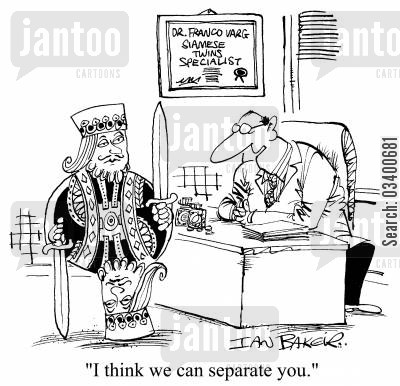The normal procedure for players is to carefully preserve their high cards. When you follow suit to a trick, which you cannot or do not wish to beat, you play your lowest card, thereby saving higher cards in the hope that you may promote an eventual winner.
This is the proper procedure, but un-thinking and automatic saving of high cards may become embarrasing at times. You may, later on, be thrown into the lead with that high card and forced to make a losing return. The average player is sometimes misled regarding the true value of high cards. To him an Ace is an Ace, a King a King, and a Queen, Queen. Their nominal value in view of their rank does not always express their real value.
Your high card, which you have carefully saved, may take a trick later on, but it may take that trick at a very high cost. Had you been astute enough to rid yourself of that high card when you had the chance, your partner might have been able to take two or three tricks instead.
A Valueless Queen
The following deal aptly illustrates the case in point. East, who is defending against a no-trump game contract, automatically plays his lower spade the first time the suit is led by declarer. This careless and thoughtless play prevents :West from obtaining the lead, and allows South to make his contract. Here is the distribution:
West opened with the club Queen which was taken by South’s King. Declarer made his move to cash four diamonds by leading the Jack and finessing, with East winning with the King. His club return was taken by South’s ace, and now three rounds of diamonds were scored, the last one in dummy with the closed hand discarding a small club.
Next the ace of spades was cashed in dummy, with declarer noting East’s play for the nine spot. Declarer now reasoned that East was probably out of clubs. If he still had one, then only one club trick could be cashed against him. On the other hand, if East was blank in clubs and diamonds, and held one more spade (an honor), a spade throw-in would force him to return a heart into dummy’s King, which would be the all important trick to declarer.
Going on this line of reasoning, South then led a small spade from dummy. Sure enough, East won with the Queen as South ducked. Now he had to return a heart, and South made his contract, scoring three spades, one heart, three diamonds and two clubs. Please note that when South played the King of spades later on the Jack dropped from West, which established his fourth small spade for the ninth trick. A small but important point in South’s play is the fact that when he discarded on the fourth diamond, he did not make the mistake of pitching a spade while holding a useless losing club.
It is quite obvious that East made a mistake by not playing his spade Queen under dummy’s ace at the seventh trick. He knows that his partner has established at least two club winners, possibly three, and in order to cash these good tricks he must gain an entry. What high card can he hold with which to gain that entry? It certainly cannot be the spade King, for South must hold that card to be in a game no-trump contract. Likewise, their is no hope in hearts as the King of that suit is in plain sight in dummy. Therefore it can only be the spade Jack, otherwise he will not be able to gain the lead. So, East must immediately unblock by tossing his Queen under the ace. If declarer holds that Jack, then there is no loss anyway as the Queen will not win the trick. A sharp bit of foresight—but very simple after a close analysis—should cause East to make the proper play which will defeat the contract.
